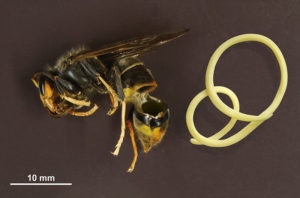The Asian Hornet
May 2017 The Asian Hornet, Our contacts at the East Dorset Beekeepers Association say, are a growing concern for Britain’s already embattled native bee population.
The Asian Hornet, Our contacts at the East Dorset Beekeepers Association say, are a growing concern for Britain’s already embattled native bee population.
The latest danger comes in the form of the Asian Hornet. It has been spreading through Europe in the last decade but until recently hadn’t been seen in the UK. But news reports confirmed a sighting of this invader in nearby Somerset last month. It is, in fact, said to favor the kind of conditions we enjoy in Dorset and the rest of southern England.
The Asian Hornet is active between February and November so we are entering high season for this problem insect. Its nests will be found in tall trees and buildings. It feeds on honeybees and other insects as well as fruit and flowers.
What does the Asian Hornet look like?
- It’s slightly smaller than the native European hornet, with a darker abdomen, up to 25mm long
- Its legs have yellow tips (unlike our native’s dark legs)
- The thorax is brown or black (our native’s thorax is more orange)
What should I do if I see an Asian Hornet?
- Don’t disturb their nests (obviously!)
- Avoid running, as this attracts their curiosity
- According to Somerset Live, sightings of this pest should be sent with a photograph and location details to alertnonnative@ceh.ac.uk
The Asian Hornet is generally no more aggressive towards humans than our native hornet. Unless you suffer from anaphylaxis (sever allergic reaction), you shouldn’t experience any more discomfort than any ordinary bee or wasp sting would cause.
Nevertheless it is a most definitely an undesirable invasive species. The fact that it preys on native insects will cause problems for honeybees and other local species.
Our native honeybees and other pollinators are already under significant pressure which is why everyone from Dorset beekeepers to DEFRA personnel is so concerned.
Stay ahead of the curb on pests by taking a look at the Pest calendar!